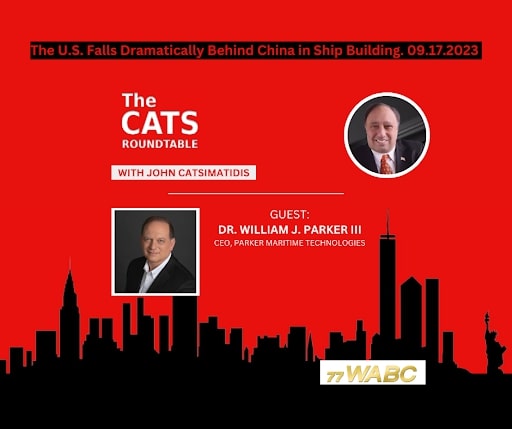U.S. Falls Dramatically Behind China in Shipbuilding: A Conversation with Dr. William J. Parker III.
In a recent episode of the Cats Roundtable Show hosted by John Catsimatidis on 77WABCradio, Dr. William J. Parker III, CEO of Parker Maritime Technologies, discussed the concerning state of shipbuilding in the United States and its implications for national security. Dr. Parker, a former Naval Officer and President of the East-West Institute, highlighted the challenges the U.S. faces in shipbuilding and how China has surged ahead in this critical domain.
The State of U.S. Navy and Shipbuilding: Catsimatidis began the conversation by addressing a prevalent issue that has been the subject of scrutiny in various magazines – the allocation of resources within the U.S. Navy in the past decade. The discussion revolved around the quality and functionality of ships built during this period. Dr. Parker, however, clarified that he does not represent the Navy but proceeded to provide valuable insights.
Littoral Combat Ships (LCS)
Dr. Parker acknowledged that the Littoral Combat Ship (LCS) program had its share of issues. While it was intended to be a cost-effective stop-gap measure while a new ship class was developed, it faced several problems, such as being built in two different shipyards and having an array of modifications that strained its original purpose. Despite these issues, LCS ships were relatively inexpensive compared to the more capable Arleigh Burke destroyers.
Building New Ship Classes
The Zumwalt class, intended to replace LCS, was originally planned to have 32 ships but ended up with only two. Dr. Parker noted that this situation posed challenges to the Navy as it disrupted continuity in shipbuilding. He also emphasized that teething problems often occur with any new ship class, referring to the early struggles of the Arleigh Burke destroyers.
China’s Shipbuilding Advantage
Dr. Parker’s central point was the striking disparity in shipbuilding capacity between China and the United States. China currently has the capacity to build ships 232 times that of the United States. Furthermore, China can construct combatants more than 200 times faster than the U.S., giving them a significant advantage. Dr. Parker emphasized that during World War II, the U.S. relied on its shipbuilding capabilities, producing a Liberty ship a day at its peak. China’s Merchant Marine Force dwarfs that of the U.S., making it imperative for the U.S. to focus on revitalizing its shipbuilding industry to maintain national security.
The Urgency of Rebuilding Shipbuilding Capacity
In conclusion, Dr. Parker stressed that it was crucial for the United States to prioritize shipbuilding and restore its shipbuilding capacity swiftly. He called on Americans to reflect on the origin of their everyday items and how few are domestically manufactured, underlining the need to regain the ability to build things in the United States. Ultimately, he asserted that revitalizing shipbuilding was not just an economic concern but a matter of national security.
In this interview, Dr. William J. Parker III’s insights shed light on the critical state of shipbuilding in the United States and the pressing need to bridge the gap with China in shipbuilding capacity. His call to action underscores the importance of investing in this sector to maintain national security and economic resilience in an increasingly competitive global landscape.





